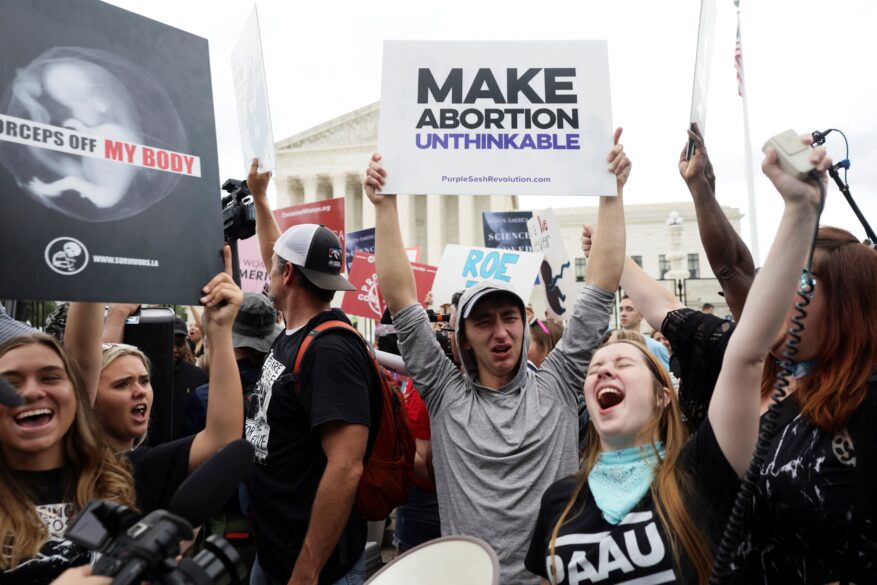By Kate Scanlon
WASHINGTON (OSV News) – Prior to the second anniversary of a landmark decision by the U.S. Supreme Court to overturn its prior abortion precedent, pro-life activists said much of their work remains to be done.
Bishop Michael F. Burbidge of Arlington, Virginia, chair of the U.S. Conference of Catholic Bishops’ Committee on Pro-Life Activities, told OSV News in a June 10 interview “we realized quickly we have a challenge on our hands,” pointing to losses at the ballot box after the Dobbs ruling, with more such contests on the horizon.
“So after two years, there is still reason to celebrate because we know God’s grace is more powerful than all this, but also, we have to embrace the challenge that faces us,” he said.
The Supreme Court issued its historic decision in Dobbs v. Jackson Women’s Health Organization June 24, 2022, a little over a month after Politico published a leaked draft of Justice Samuel Alito’s opinion in the case. The leak caused a public firestorm before the court issued its official ruling and is seen as the most significant breach of the court’s confidentiality in its history.

The Dobbs case involved a Mississippi law banning abortion after 15 weeks, in which the state directly challenged the high court’s previous abortion-related precedents in Roe v. Wade (1973) and Planned Parenthood v. Casey (1992). The Supreme Court ultimately overturned its own prior rulings, undoing nearly a half-century of its own precedent on the issue and returning it to legislatures.
While Roe and its ensuing precedents were in place, states were generally barred from restricting abortion prior to viability, or the point at which a child could survive outside the womb. When Roe was issued in 1973, fetal viability was considered to be 28 weeks gestation, but current estimates are generally considered to be 23-24 weeks, with some estimates as low as 22 weeks as medical technology continues to improve. After the Dobbs ruling, states across the country quickly moved to either restrict or expand access to abortion.
While supporters often described Roe as settled law, opponents argued the court in 1973 improperly legalized abortion nationwide, a matter opponents said should have been left to Congress or state governments. Many, including the Catholic Church, opposed the ruling on moral grounds that the practice takes the life of an unborn child. Opponents of the ruling challenged it for decades, both in courts and in the public square, such as the national March for Life held annually in Washington.
Jeanne Mancini, president of the March for Life organization, told OSV News that after Dobbs, there was “so much confusion about what that means and anger and frustration from people who are confused about the inherent dignity of the unborn child and how abortion impacts women. So, I think that we’re still very much in the middle of that reverberation.”
When discussing abortion policy, Mancini said, pro-life advocates should strive “to get very clear” on the specific state, law or situations involved “because there’s a lot of misinformation out there right now.”
In the years following Dobbs, some women in states that restricted abortion said they were denied timely care for miscarriages or ectopic pregnancies or experienced other adverse pregnancy outcomes as a result of medical professionals’ hesitation due to unclear abortion legislation. But pro-life activists said laws restricting abortion contained exceptions for such circumstances. Their opponents claimed bill texts insufficiently addressed those circumstances or lacked clarity on exceptions.
Public support for legal abortion also increased after Roe was overturned, according to multiple polls conducted in the years following the Dobbs ruling. In multiple elections since the ruling, ballot measures on abortion have so far proven elusive for the pro-life movement. In elections in both 2022 and 2023, voters in Ohio, California, Kentucky, Michigan, Montana, Vermont and Kansas either rejected new limitations on abortion or expanded legal protections for it.
Kelsey Pritchard, state public affairs director for SBA Pro-Life America, told OSV News in an interview that since the Dobbs decision, “we’ve gained major ground in the fight for life.”
“And you look at the states, and today we have 24 states that have laws defending life at 15 weeks or sooner, and 20 of those states have a law that protects babies with a heartbeat,” she said.
Pritchard said pro-life advocates must respond to “fear-mongering” about state abortion restrictions, including arguing that “there is a life of the mother exception in every single state” with restrictions.
Asked about how pro-life advocates should approach ballot initiatives on abortion, Bishop Burbidge said that efforts have been made, and should continue to be made, “to win minds by proclaiming the truth and proclaiming the Gospel of Life.”
“We have to speak to the hearts of people who love women and love children. So do we. So do we, and we want to be there for every woman and every child,” he added.
Bishop Burbidge said that those seeking to aid the pro-life cause should offer their prayers, and they can sign up for alerts and resources on the committee’s work by visiting respectlife.org.
“I think beyond our role in advocacy too, the Catholic Church has long offered hope, healing, and material support to vulnerable mothers and children,” he said, noting that Walking with Moms in Need and Project Rachel are a means of such support.
Kate Scanlon is a national reporter for OSV News covering Washington.
